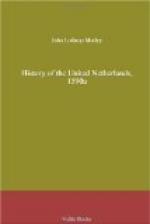It is true that the nobles, as, a class, had a voice in the provincial and, in the general assembly, both for themselves and as technical representatives of the smaller towns and of the rural population. But, as a matter of fact, the influence of this caste had of late years very rapidly diminished, through its decrease in numbers, and the far more rapid increase in wealth and power of the commercial and manufacturing classes. Individual nobles were constantly employed in the military, civil, and diplomatic service of the republic, but their body had ceased to be a power. It had been. the policy of William the Silent to increase the number of cities entitled to send deputies to the States; for it was among the cities that his resistance to the tyranny of Spain, and his efforts to obtain complete independence for his country, had been mainly supported. Many of the great nobles, as has been seen in these pages, denounced the liberator and took sides with the tyrant. Lamoral Egmont had walked to the scaffold to which Philip had condemned him, chanting a prayer for Philip’s welfare. Egmont’s eldest son was now foremost in the Spanish army, doing battle against his own country in behalf of the tyrant who had taken his father’s life. Aremberg and Ligny, Arachot, Chimay, Croy, Caprea, Montigny, and most of the great patrician families of the Netherlands fought on the royal side.
The revolution which had saved the country from perdition and created the great Netherland republic was a burgher revolution, and burgher statesmen now controlled the State. The burgher class of Europe is not the one that has been foremost in the revolutionary movements of history, or that has distinguished itself—especially in more modern times— by a passionate love of liberty. It is always easy to sneer at Hans Miller and Hans Baker, and at the country where such plebeians are powerful. Yet the burghers played a prominent part in the great drama which forms my theme, and there has rarely been seen a more solid or powerful type of their class than the burgher statesman, John of Olden-Barneveld, who, since the death of William the Silent and the departure of Lord Leicester, had mainly guided the destinies of Holland. Certainly no soldier nor statesman who ever measured intellects with that potent personage was apt to treat his genius otherwise than with profound respect.
But it is difficult to form a logical theory of government except on the fiction of divine right as a basis, unless the fact of popular sovereignty, as expressed by a majority, be frankly accepted in spite of philosophical objections.




